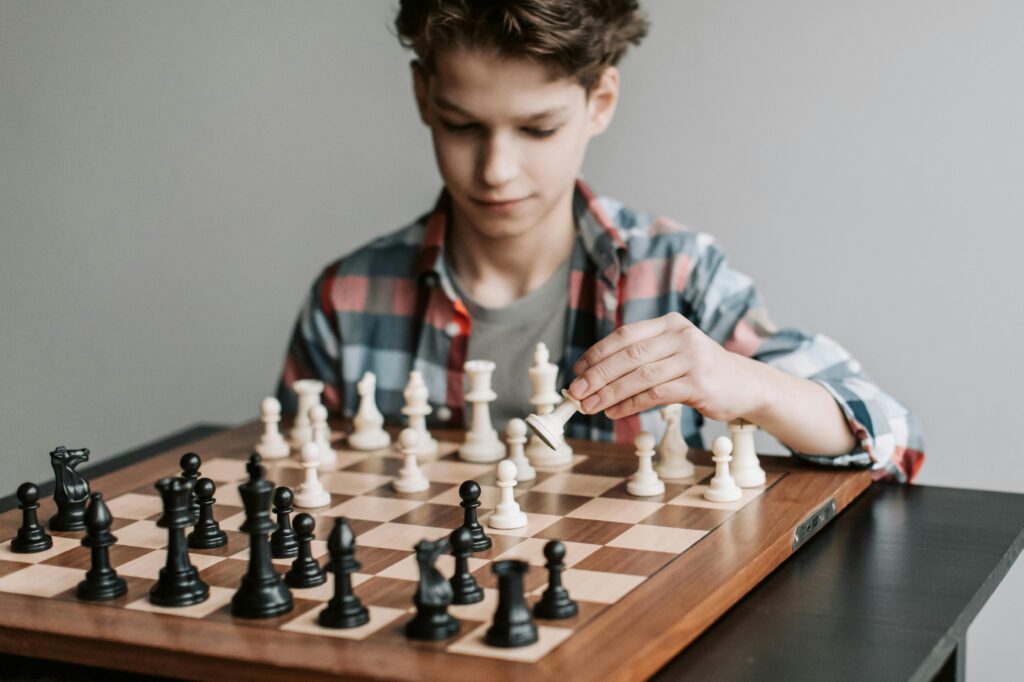If you’re a parent in Moortown, Leeds, wondering where your child can learn chess the right way, you’re in the right place. This article is here to help. Not just to list some chess academies, but to help you truly understand what makes one better than the other. Because let’s face it, not all chess coaching is the same.
Online Chess Training
The Landscape of Chess Training in Moortown and Why Online Chess Training is the Right Choice
Moortown, Leeds is a beautiful place. Families here care a lot about education and giving their children the best. Over the past few years, chess has quietly become one of the most loved activities by parents and kids alike. It’s not just about learning a game anymore—it’s about building skills that last for life.
In Moortown, there are a few local clubs and some after-school chess groups. They’re nice for casual play. But when parents want their children to grow fast, improve steadily, and get personal attention, they quickly realize something: local chess groups often don’t go far enough.
This is where online chess coaching is changing everything.
You don’t have to drive across the city. No need to sit in a cold hall waiting for the session to finish. No more trying to get your child to focus in a noisy room with 15 other kids.
Online chess training brings the teacher to your home. All your child needs is a quiet space and a laptop. And just like that, they’re learning from the best—no matter where they live.
In fact, online chess has become the go-to choice for families all over the UK who want real, professional-level coaching. And in Moortown, it’s catching on fast.
Here’s why online chess is not just convenient—it’s better:
- Live interaction with top coaches who focus just on your child.
- Clear progress paths with levels, goals, and certificates.
- Flexible timings that work around school and family time.
- Global tournaments where kids can test their skills and make new friends.
And all of this happens from the comfort of your home. Rain or shine, your child never misses a class.
How Global School of Chess is The Best Choice When It Comes to Chess Training in Moortown
Now, among all the online academies out there, Global School of Chess is truly special. Let me explain why.
We aren’t just a place where kids learn to move pieces. We are a full academy built by expert coaches who care deeply about each child’s journey.
Here’s how we’re different.
First, our coaches are FIDE-certified. That means they’re recognized by the top chess organization in the world. They’re not just strong players—they know how to teach.
But more than that, our coaches are kind, patient, and love working with kids. They make learning fun. They help shy kids speak up. They guide competitive kids to play fair and think smart.
Next, we follow a structured curriculum. Every child starts with a clear path. We assess their level and place them where they’ll grow best. From there, they move up step-by-step, always knowing what’s next. This is not common. Most chess programs just wing it. We don’t.
And here’s something else: we hold bi-weekly tournaments. These are not just for fun (though they are fun!). They help kids learn how to stay calm under pressure. They teach kids how to win with grace and lose with courage. And they give real-world practice, which is key to getting better.
We also offer private one-on-one sessions. This is where the magic really happens. In these classes, the coach gives 100% attention to your child. They spot mistakes. They fix patterns. They challenge the child in just the right way. The results are often quick and amazing.
And because we’re online, we work with families from more than nine countries across four continents. Your child joins a global family. They see how chess connects the world. And they feel proud to be part of it.
Parents often tell us, “My child has become calmer, more focused, and more confident since starting chess classes with you.” That’s what we love to hear. Because that’s our goal—not just to build better players, but to build better people.
Now let’s look at offline chess training and how it compares.
Offline Chess Training
While online chess training is booming across the world, offline chess still plays a role—especially in close-knit communities like Moortown. Local clubs, schools, and community centers continue to offer face-to-face chess classes. These environments provide something unique: physical presence, spontaneous discussions, and a sense of local belonging.
But here’s the thing—offline training needs to evolve if it wants to stay relevant.
Right now, many offline chess academies operate the same way they did 15 or 20 years ago. A group of kids. A coach with a board. Some printed puzzles. Maybe a short tournament at the end of term. While this model feels familiar, it doesn’t match the pace, personalization, or technology-driven learning that today’s kids are used to.
If you run or are part of an offline academy in Moortown, here are some powerful ways to upgrade your program and stay competitive:
Use tech tools in the classroom. Even if you teach in person, bring in laptops, chess apps, or smartboards. Show real-time games from world-class tournaments. Solve digital puzzles together. Kids love screens—use that to your advantage.
Create a structured learning map. Don’t just “teach what comes up.” Build levels. Give students a roadmap—like Beginner, Intermediate, Advanced. Create milestones, rewards, and certificates. This gives both kids and parents a clear sense of growth.
Offer hybrid options. Sometimes, kids miss classes. Why not record lessons or offer a livestream for those who can’t attend? You could also run online analysis sessions mid-week to reinforce concepts taught in class.
Improve coach-to-student ratios. A common issue in offline classes is one coach managing too many kids. Consider hiring assistant coaches or volunteers so every student gets attention. The smaller the ratio, the better the learning.
Build a community outside of class. Create a WhatsApp or Discord group for your students and parents. Share puzzles. Announce mini-challenges. Celebrate student achievements. Community keeps kids engaged, even between lessons.
Connect with online experts. Partner with strong online players or coaches for occasional workshops. This brings fresh perspectives and new learning styles, and shows your students that their chess journey can go beyond Moortown.
Run serious internal tournaments. Casual play is fun, but kids grow when there’s structure. Set up rating systems. Keep leaderboards. Let students see their improvement on paper, not just by feel.
Focus on parent involvement. Many parents want to help but don’t know how. Offer short sessions just for them—“How to Support Your Child’s Chess Journey.” Give them tools to encourage learning at home.
Drawbacks of Offline Chess Training
Most offline chess academies in towns like Moortown are built on tradition—and while tradition is comforting, it can also be limiting. Parents today expect more. Kids are growing up in a digital world. If offline training doesn’t adapt, it risks falling behind.
Let’s look at a few additional, often overlooked drawbacks of offline chess instruction—and offer concrete, business-smart solutions that any academy can start using today.
Hidden Downtime in Classrooms
In offline group classes, a lot of time is wasted. Kids wait while the coach checks homework or sets up a board. Others finish puzzles early and just sit around. This idle time adds up and leads to boredom.
Action Tip: Introduce “mini stations” during classes. Have a few puzzle boards, mini challenges, or brain games ready for early finishers. This keeps the momentum going and reduces lost learning time.

Limited Tracking of Progress
Many offline setups lack proper progress reports. Parents often ask, “How is my child doing?” and get vague answers like “They’re doing fine.” This doesn’t work anymore.
Action Tip: Use free or low-cost tools like Google Sheets or Trello to create simple student portfolios. Track what was taught each week, what was mastered, and what needs work. Share this monthly with parents.
Dependency on the Main Coach
Offline chess centers often revolve around one main coach. If that coach is unavailable, the whole program suffers. Lessons get delayed. Quality drops.
Action Tip: Train a backup team. Create a teaching manual or video series of your methods. This allows substitutes to step in without losing quality or style. It also protects your business from burnout or unexpected breaks.
Inflexibility of Class Times
Offline training is fixed. If a student misses a class, the knowledge gap grows. The coach can’t redo the lesson just for them, and others move ahead.
Action Tip: Offer a weekly “Catch-Up Hour” where students who missed a session can join a smaller group to review. This shows you care and boosts your value as an academy.
No Data-Driven Insights
Online platforms often use data to show how students perform—win/loss ratios, common mistakes, progress charts. Offline training misses out on this.
Action Tip: Use apps like ChessBase, Lichess studies, or even spreadsheets to log game results. Spot trends. Help students see their most common errors. Parents love data—and it builds trust.
Limited Engagement Outside the Classroom
Most offline classes end when the clock runs out. But true learning happens beyond class time—especially when curiosity kicks in.
Action Tip: Start a weekly email or group message with a puzzle of the week, a short video lesson, or a chess trivia quiz. Keep students thinking, and your brand top of mind.
Best Chess Academies in Moortown, Leeds
Global School of Chess
At the very top of our list is the Global School of Chess, a premier online chess academy renowned for its structured curriculum and personalized coaching.
With a team of FIDE-certified coaches, the academy offers live interactive classes, private coaching, and bi-weekly online tournaments. This structured approach ensures that students not only learn the game but also develop critical thinking, strategic planning, and confidence.
The academy’s emphasis on individual learning styles means that each student receives tailored instruction, fostering rapid improvement. Moreover, the convenience of online classes eliminates the need for travel, making it accessible for families in Moortown and beyond.

Students from over nine countries across four continents participate in the academy’s programs, creating a truly global community.
Parents have noted significant improvements in their children’s focus, patience, and decision-making skills since enrolling. The academy’s commitment to excellence and holistic development makes it the best choice for chess training in Moortown.
Leeds Junior Chess Club
Leeds Junior Chess Club is a local institution dedicated to nurturing young chess talents. They focus on providing a supportive environment for children to learn and enjoy chess. The club meets regularly, offering sessions that cater to various skill levels.
However, their approach is primarily offline, which may not offer the flexibility that online platforms provide. Additionally, while they have experienced coaches, the lack of a structured, progressive curriculum can make tracking individual progress challenging
Alwoodley Chess Club
Alwoodley Chess Club is a friendly and inclusive community club that welcomes players of all standards. They meet on Wednesday evenings at the Alwoodley Community Centre, providing opportunities for both social and competitive play.
The club operates several teams in local leagues, offering members a chance to participate in competitive matches. However, their sessions are primarily geared towards adult players, and they may not offer structured coaching programs for children.
Royal Chess Coaching Academy
The Royal Chess Coaching Academy offers professional chess coaching services in the Leeds area and across the United Kingdom. With over 20 years of experience, they provide online training for players of all levels, from beginners to professionals.
Their tutors include Chess Champions, Grandmasters, and International or FIDE Masters, ensuring high-quality instruction. However, their programs may not be as tailored to children’s learning styles and needs as those offered by the Global School of Chess
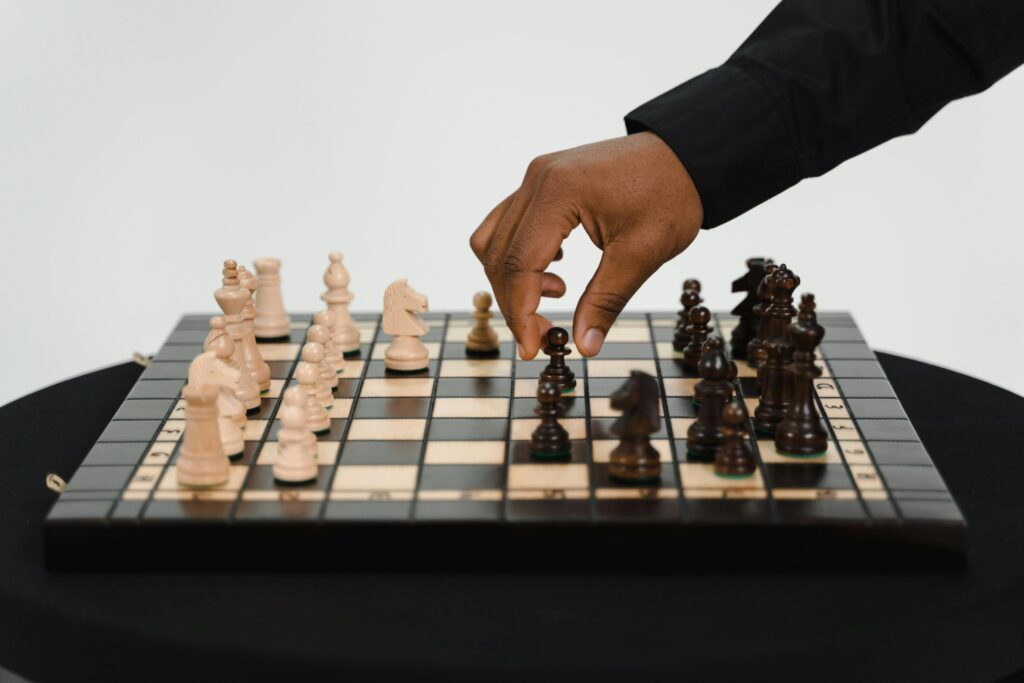
Leeds Chess Club
Leeds Chess Club is a well-established club that meets every Wednesday evening at The West Riding Hotel in Leeds City Centre. They participate in local leagues and offer a welcoming environment for players of all abilities.
While the club provides opportunities for competitive play, they do not offer structured coaching programs, particularly for children. Their focus is more on adult players and casual games, which may not be ideal for those seeking formal instruction.
Why Online Chess Training is The Future
Something big has changed in how kids learn today. And chess is part of that change.
A few years ago, most people thought learning chess meant sitting in a classroom or a club. But now, more and more families are choosing online chess training. And for good reason.
Online chess isn’t just about playing on a screen. When done right—like at Global School of Chess—it becomes a full, rich learning experience that’s better than anything else out there.
Here’s why.
First, online chess saves time. You don’t need to travel. No packing bags. No waiting in traffic. Just sit down, click a button, and your child is in class. It’s that simple. And that extra time? You can use it for school, homework, or just family fun.
Second, online coaching is more personal. In traditional classrooms, the coach has to teach many kids at once. But in online settings—especially one-on-one lessons—the coach focuses only on your child. That means faster learning, fewer mistakes, and better progress.
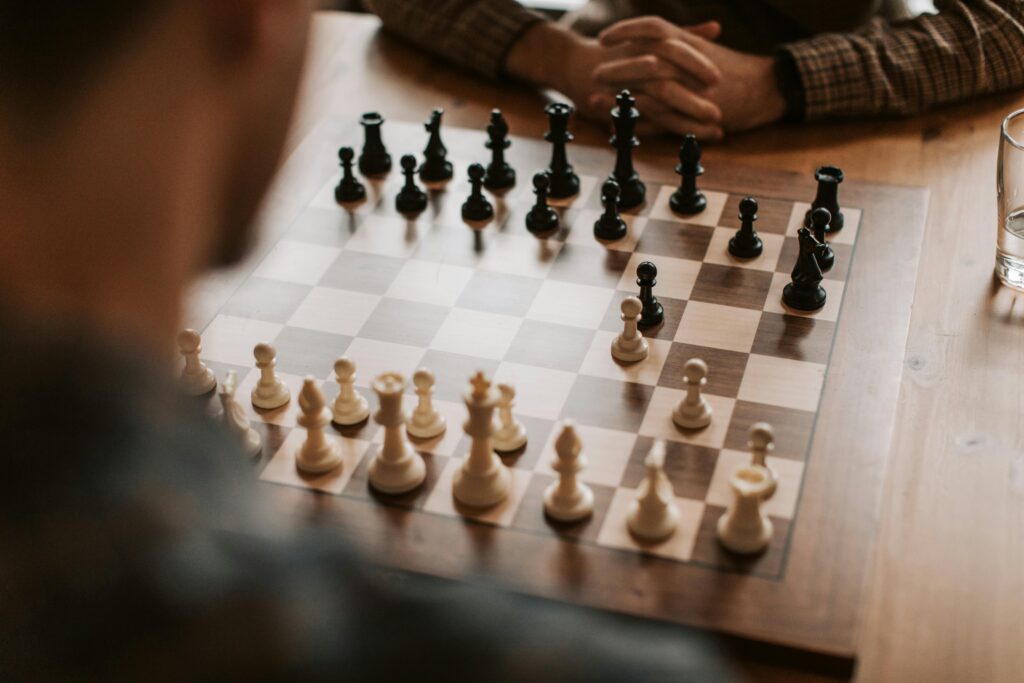
Third, technology makes learning fun. We use smart boards, live puzzles, interactive games, and even real-time feedback tools. Kids don’t just learn—they get to play, solve, and explore at the same time. And because it’s fun, they stay excited to learn more.
Fourth, online classes are flexible. If your child has a school project or isn’t feeling well, we can easily reschedule. If they miss a class, we send the recording. No stress. No gaps in learning.
Fifth, and maybe most important, online chess brings the world to your child. In Global School of Chess, kids meet others from the U.S., India, South Africa, and more. They learn about new cultures. They play in international tournaments. They feel part of something bigger.
This kind of exposure is powerful. It builds confidence. It teaches respect. And it shows kids that their love for chess can take them anywhere.
That’s why online chess is not just the future—it’s the present. And it’s the best choice you can make for your child’s chess journey.
How Global School of Chess Leads the Online Chess Training Landscape
In the vast world of online chess training, many platforms promise improvement. But very few deliver it with consistency, care, and clarity. That’s where Global School of Chess (GSChess) stands far above the rest.
We’re not just another chess website. We are a full-service academy with a heart for kids and a brain for serious, smart training. Here’s how we lead the field—and what other businesses can learn from our success.
A Learning System That Thinks Like a Coach
At GSChess, we’ve built something unique: a dynamic learning system that mimics how a great coach thinks. Our curriculum isn’t just about what lesson to teach—it’s about when to teach it, how to teach it, and why it matters for the child’s growth at that moment.
Business Insight: Build systems, not just lessons. Don’t teach what’s “popular” this week—teach what fits into a long-term, structured growth path. Parents respect structure. Kids thrive in it.
World-Class Coaches With Classroom-Level Training Skills
All our coaches are FIDE-certified, but that’s just the start. We train them to work with all kinds of learners—shy kids, fast learners, and even those who get bored easily. We use role-plays, soft-skill sessions, and ongoing evaluations. This keeps our coaching team not just sharp, but empathetic and creative.
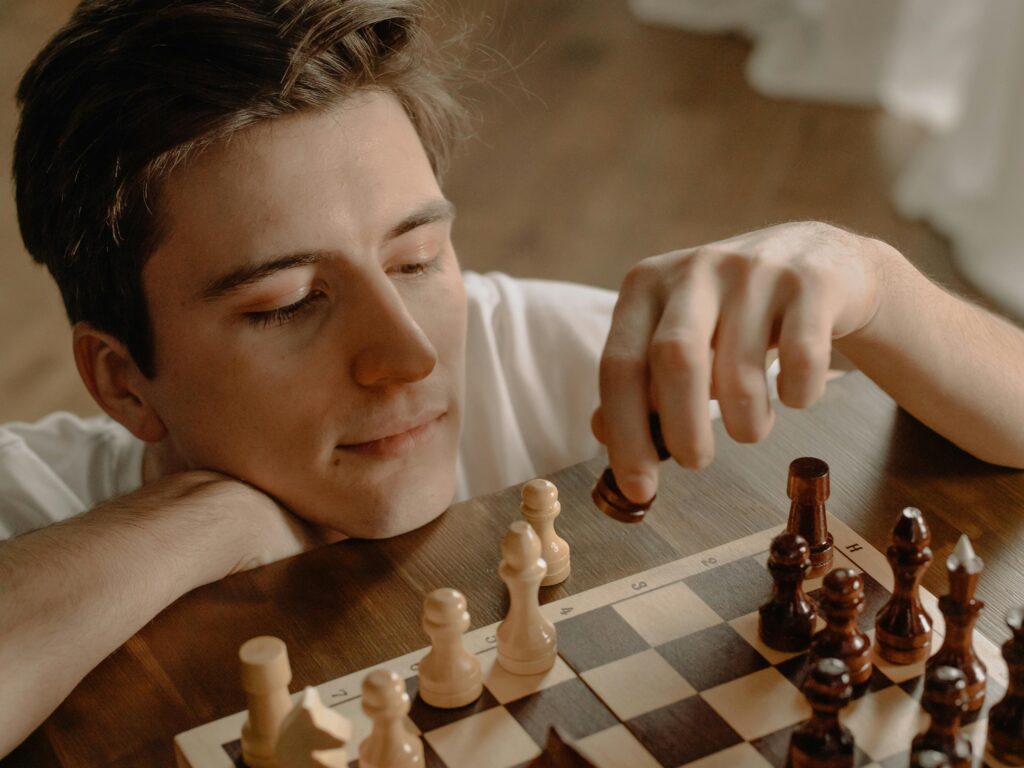
Actionable Tip: Train coaches in soft skills. Knowing chess is great, but knowing how to connect with children online is what keeps students coming back.
Live Feedback Loops With Parents
Our program includes regular check-ins with parents. We don’t wait for problems to show up—we proactively report progress, struggles, and wins. This builds massive trust. It turns first-time users into long-term believers.
Business Strategy: Don’t hide behind email. Create real-time touchpoints with families. A five-minute call every month can do more than a fancy report.
Community Without Borders
GSChess is home to kids from over nine countries, but we make it feel like one neighborhood. We run team battles, global chess fairs, and buddy sessions where kids can meet, train, and even mentor each other.
Unique Strategy: Build micro-communities inside your academy. Let older students mentor younger ones. Let kids co-host events. This sense of belonging increases retention.
Innovation First, Always
We don’t wait for trends—we create them. GSChess was one of the first academies to offer:
- Parent Chess Nights (so families can play and learn together)
- Monthly student awards that go beyond winning (like “Most Thoughtful Move”)
- In-class polls and real-time thinking challenges via smart tools
Pro Tip for Other Businesses: Don’t just copy the chess world. Learn from the education world. Use EdTech tricks to boost engagement. Try live quizzes, instant voting, or even short meditation breaks mid-class.
Results That Speak Beyond Ratings
Of course, our students grow in ratings. But more than that, they grow in confidence. Parents tell us their kids are calmer under pressure, more focused in school, and better at making smart decisions in everyday life.
What This Means: We don’t just teach chess. We build thinkers. Leaders. Problem-solvers.
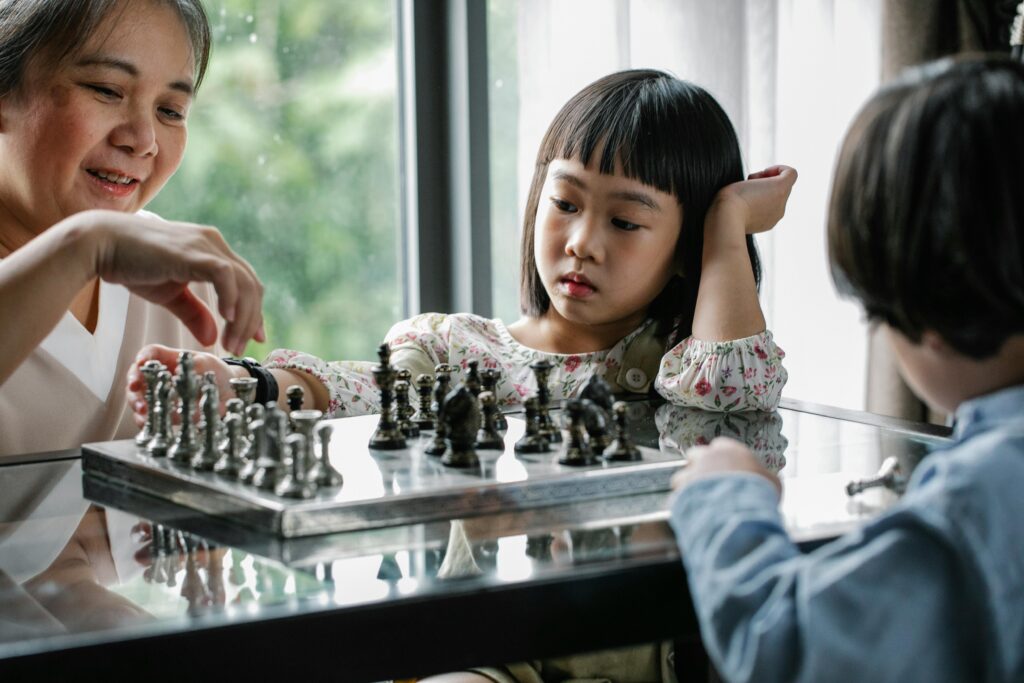
That’s why we’re not just leading the online chess space—we’re reshaping it.
Wrapping It Up
Chess is more than a game. It’s a way to grow smarter, calmer, and more confident. In a place like Moortown, where families value both learning and balance, choosing the right chess academy can make all the difference.
We’ve explored the local scene. We’ve looked at what offline clubs offer. We’ve talked about the new world of online training—and why it’s changing lives.

